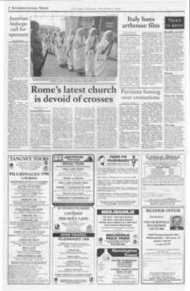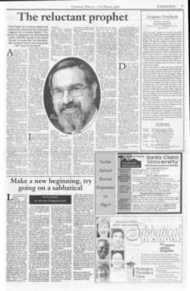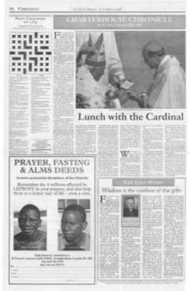Page 7, 6th March 1998
Page 7

Report an error
Noticed an error on this page?If you've noticed an error in this article please click here to report it.
Tags
Share
Related articles
Marriage Week
Bma Members Challenge 'sinister' Guidelines On The Dying
Scotland Loses 'one Of Her Greatest Sons'
Ch1e1 2 Rabbi
Turning Strangers Into Friends
The reluctant prophet
Chief Rabbi Dr Jonathan Sacks has profoundly influenced the social and religious life of modern Britain. This month he celebrates his 50th birthday. LUKE COPPEN spoke to him about his call to leadership, his friendship with Cardinal Hume, and what gives him hope for the future.
AS HE sits in his Finchley office surrounded by weighty tomes, Dr Jonathan Sacks gives the impression of being a shy, abstracted Oxbridge don a man thoroughly absorbed in thought and work.
But as he walks around his desk, dropping into a more comfortable chair, a different Dr Sacks appears. This is the man who is renowned for passionate conviction, who speaks with astonishing facility in soft slow tones which have become a trademark.
As befits someone who has written forcefully of the importance of the family, the Chief Rabbi credits his parents for making him the person he is today.
"I learned from both my late father and my mother, who is still alive, the extraordinary investment they placed in their children. That gave us, my brothers and myself, a very precious heritage and it made me very sensitive to the dangers that we risk when we fail to put the family at the centre of our values."
The investment that Chief Rabbi Sacks' parents made paid early dividends. He was an outstanding pupil, and at 18 gained a place at Cambridge University to read philosophy.
It was there that he had his first intimations of his future as a religious leader. "I sympathise with many of the great figures of the Hebrew Bible who wrestled with that issue many times," he reflects.
"Moses declines the Almighty's invitation to lead the Jewish people four or five times in the opening book of Exodus. Therefore I subscribe to the idea that leadership is not necessarily a feeling of personal worthi ness, so much as responding to an imperative from outside of yourself."
On leadership, Dr Sacks maintains that: "it has never been my ambition. It's always been a calling. I think the call of leadership comes to us all. It's just that some of us hear it in a way that's inescapable.
"I've been driven by a powerful sense that certain things needed doing and weren't being done, and certain things needed to be said and weren't being said."
Dr Sacks drives these last words home with passionate emphasis. They, and later comments, suggest that the Chief Rabbi sees his role in prophetic terms.
His comments on British society have certainly been prophetic. As early as 1990, in the BBC Reith Lectures, Dr Sacks identified the moral crisis at our society's heart. Traumatic events, such as the murders of James Bulger and Philip Lawrence proved him dreadfully right.
His subsequent writings and broadcasts developed the theme and earned him the ear of people of all kinds who are concerned with the society we live in.
But prophets do not merely point out faults, they offer solutions. In 1997 Dr Sacks published The Politics of Hope, an ambitious attempt to restore faith, the family and community to a central position in public life.
But jusf as the book appeared, the Chief Rabbi was engulfed in a ferocious communal controversy. A letter which Dr Sacks wrote to Dayan Padwa, nonagenarian head of the Union of Orthodox Hebrew Congregations, was leaked to the Jewish Chronicle.
N IT Dr Sacks described
the conflict he felt in publicly praising the late Reform leader Rabbi Hugo Gryn, "who was amongst those who destroy the faith." This heated simmering tensions between orthodox and non-orthodox Jews to boiling point.
The Chief Rabbi is anxious to put the episode behind him and concentrate on the painstaking work of community building. Its very mention makes him wince.
"I feel that some of the religious difficulties have been exaggerated and my experience is that the vast majority of the Jews within the community want to be able to work together and co-exist in mutual respect," he
This feeling is shared by Rabbi Tony Bayfield, rabbinical leader of the Reformed Synagogues of Great Britain, who says: "We are ready and prepared to work with Rabbi Sacks to build a community that is more co-operative and harmonious."
But there are obstacles to such harmony. The most serious is that orthodox Judaism doesn't recognise the validity of non-orthodox denominations. (Similarities to the Catholic Church prior to the ecumenical revolution at Vatican II are striking.) "There has to be a recognition that we, together with our sister liberal movement, represent a quarter of synagogue-affiliated Jews in the UK," says Rabbi Bayfield. "We are not prepared to collude with the illusion that the British Jewish community is monolithic and has one religious leader."
Chief Rabbi Sacks indicates that he has sent out feelers to the leader of the nonorthodox community and hopes to bridge the divide through practical co-operation. "I think the non-orthodox community should be well aware that I desire nothing more than a harmonious community, which has a sense of mutual responsibility and respect."
This is a fraught task and one can only wish Dr Sacks luck. It's difficult to see bow he can win over such acid critics as David Goldstein, senior rabbi at the Liberal Jewish Synagogue in St John's Wood.
"He's a prophet without honour. In his actions so far he has not demonstrated moral courage or the ability to stand up for principle," says Rabbi Goldstein, contrasting Dr Sacks' standing within t h e community to his reputation outside it. "To the outside world, he's regarded for his evident and obvious intellect. Within the community his reputation is at an all-time low."
Beyond the tight, feuding circles of anglo-Jewry, the Chief Rabbi's acclaim is unequivocal. His remarkable communication skills halve carried his message into houses and hearts across Britain. He believes that this ability to talk to those of other faiths grew out of his early Church of England schooling.
His "first moments of encounter and dialogue" with Catholicism came later, when his chief rabbinate brought him into contact with Cardinal Hume. "I have cherished in particular my warm friendship with Cardinal Hume as one of the outstanding privileges of my time in office," he says, with unquestionable sincerity.
This deep affection is plainly mutual. "He has made a great contribution to religious thinking in this country through his writing and speaking," says Cardinal Hume. "And he has been a very congenial colleague with whom to work."
"The Cardinal has a deep sense of the tragedy of the holocaust," notes Dr Sacks, "and of the need to move beyond the attitudes that have shaped the relations between Jews and Christians in the last two millennia. In this he reflects the general movement within the Catholic Church, but does so with a very evident personal depth of feeling, which I find very moving."
Dr Sacks doesn't believe that the recent series of apologies by the Church, notably the French bishops, has been too little too late.
"For a great faith to alter its direction is a slow and gradual process and I respect that.
"I do not underestimate the degree of soul-searching and deep spiritual honesty that has gone on within the Catholic Church in the last three or four decades. I find it deeply impressive, and a signal that we can move on from the past."
As co-president of the Council of Christians and Jews (CCJ), Dr Sacks has played a key role in JewishCatholic dialogue. Recently, however, he has resisted calls from the International Council of Christians and Jews (ICCJ) to open the dialogue to Muslims.
In a response to this decision Sir Sigmund Sternberg, who is currently vice president of the ICCJ, formed the Three Faiths Forum, which has representatives from Christian, Jewish and Islamic communities. "I would have liked Dr Sacks to have been directly and personally involved in the work of the Three Faiths Forum," comments Sir Sigmund.
But Dr Sacks believes that the CCJ is not the place for tripartite dialogue. "The Council of Christians and Jews is engaged in a very particular conversation.
"In my view, and indeed in the view of the Christian leaders, there is an equal need for conversation between Christianity and Islam, and Judaism and Islam. But it is sometimes in bilateral conversations that you make most progress."
r) R Sacics takes a long view of Jewish-Christian relations. "If we were to look back on the past
thousand years, one of the most consistent features has been the very tragic experience of Jews, especially within Christian Europe.
What gives me hope for the future is what has been achieved in the last half century by way of mutual understanding and friendship, which has flourished across the frontiers of faith.
This progress looms large in Dr Sacks' highlights of the past half-century.
"I've had the privilege of being part of a lively conver sation about morality in soci ety and of being able to develop friendships with the leaders of other faiths that would have been inconceivable a generation ago.
"My faith and hope are grounded in some very personal experiences over the past 50 years, and signal to me that certain values are worth fighting for, however much opposition there is."
Dr Sacks pauses, then adds some more reflection which shows us why, at 50, he is one of Britain's most cherished and authoritative religious leaders.
"When you are able to articulate real moral and spir itual values, an echo comes back from many people who share them with you and of whom, until now, you were unaware."
And people all over Britain will echo that.
blog comments powered by Disqus











